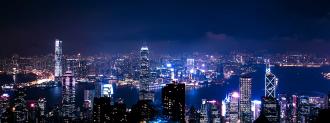With sweeping new security laws having taken effect, Hong Kongers are racing to avoid a Beijing-ordered memory hole, digitizing museum records and artifacts, and archiving the communications that organized the city’s pro-democracy movement.
In mainland China, information on the Tiananmen Square Massacre — when the Chinese military killed thousands of student demonstrators on June 4, 1989 — is forbidden, and the topic is censored by the Great Firewall.
Today, few mainland Chinese citizens have ever seen the iconic Tank Man photo, showing a lone protester facing off against dozens of People’s Liberation Army tanks.
Little wonder, then, that Hong Kong’s museum dedicated to the Tiananmen protests is looking to digitize their collection, as the new laws — which punish vaguely defined acts related to “collusion,” “terrorism,” “secession,” and “subversion” — begin to shape the political and social discourse of the city.
“The aim of the June 4 museum is to restitute history, preserve the facts, and ensure they don’t disappear from people’s minds,” Mak Hoi-wah, chairman of the museum’s managing committee, told Rest of World‘s Eric Cheung.
The museum, operated by the Hong Kong Alliance in Support of Patriotic Democratic Movements of China, plays video footage of the PLA’s assault, and prismatic posters of Hong Kong’s own protests line the wall.
Artifacts, including notebooks and helmets, provide tangible evidence of a moment authorities are actively trying to erase.
Hong Kongers hold a candlelight vigil commemorating the massacre every June 4; banned for the first time in 30 years this past summer, the protest was held regardless, leading to charges of “participating or inciting an unlawful assembly” for Mak, Cheung reports.
“Since the national security law was introduced, it has become questionable whether we can still continue with the work that we have always been doing,” Mak said. “It won’t be a surprise if they close down our museum — we’re just counting the days to see when this may happen.”
According to a BBC breakdown, the security law, which can hand down punishments of life in prison, deems vandalizing public transit facilities as an act of terrorism and allows Beijing to establish a law enforcement office in Hong Kong, with the power to extradite cases to the mainland, among other provisions.
Already its suppressive effects are being felt: protestors were arrested within hours of its implementation; books are being banished from libraries; media outlets raided — most famously Apple Daily, whose reporters live-streamed founder Jimmy Lai Chee-ying’s arrest — and protests chants were made illegal.
Protests have roiled the city since 2019, as activists fought against the passing of an extradition law with Beijing, which Hong Kongers feared would result in people being arrested and imprisoned on the mainland, without due process.
Protests bloomed, like yellow umbrellas, into a general pro-democracy movement. The pandemic did not halt the protests, but forced them to take a different shape, updating into decentralized forms held together by social media and digital spaces — including Animal Crossing.
It is that invisible architecture that archivists are also attempting to save.
The Hong Kong Free Press, in conjunction with the Journalism and Media Studies Centre at the University of Hong Kong, have created a research archive of materials related to the 2019-2020 protests, including maps, timelines, a glossary, and the arrests, charges, and injuries suffered by protestors.
University of Hong Kong journalism professor Fu King-wa — a co-founder of Weiboscope, which archives censored posts from the social media platform Weibo — has also begun to collect the Telegram messages that helped to coordinate the protests, Cheung reports.
Fu and a pair of research assistants began backing up the contents of the roughly 100 channels central to the protests, creating a searchable database published by the Free Press.
While the university currently hosts the archive, there’s copies available to enable it to live on wherever it may need to go.
“If, at some point, we finally need to move or migrate to some other place for better security, we can do it easily,” Fu told Cheung.
Few images of the 20th century are as telling — or famous — as “Tank Man,” whose solo stand before a column of Chinese tanks leaving Tiananmen Square has turned into a pro-democracy icon.
The security law now is a less dramatic, but no less draconian, exercise of the same power.
“We believe you can ban the rally but you cannot ban the heart, the remembrance, our memories… we will continue to remind the world what had happened 31 years ago,” Lee, who organizes the vigil, told Reuters.






